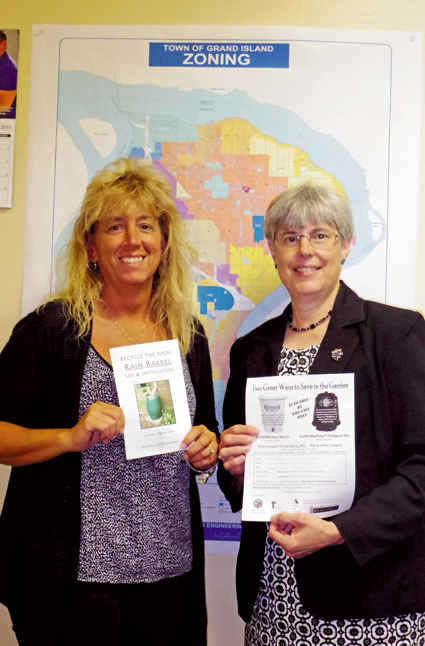Featured News - Current News - Archived News - News Categories
By Alice E. Gerard
If you have a garden, you can help your plants thrive by purchasing a rain barrel and a compost bin.
The Erie County Department of Environment and Planning is accepting orders for SYSTERN rain barrels and Earth Machine compost bins. The deadline to preorder rain barrels and compost bins is July 31. Pickup will be scheduled for mid-August and will take place at Lincoln Park in the Town of Tonawanda.
Purchasing a rain barrel will help reduce stormwater pollution, said Lynn Dingey, assistant civil engineer in the town's engineering department. "The Town of Grand Island is part of the Western New York Stormwater Coalition. Stormwater pollution prevention is our goal."
Rain that does not soak into the ground becomes stormwater runoff. Runoff picks up "dirt, debris and pollutants, such as lawn chemicals and bacteria from pet waste, as it flows over surfaces. We're trying to remove those pollutants," Dingey said.
Dingey explained the benefit of the rain barrel. "You're diverting rain water from the storm sewer system. If your downspouts go to the grass, and the water is soaking in the soil, that is great. A lot of structures are connected directly to the storm sewers. This increases the volume of water in the storm sewers, and the storm sewers flow directly to our waterways, with no treatment."

Assistant Civil Engineer Lynn Dingey, left, and Town Supervisor Mary Cooke hold the forms for rain barrels and compost bins. (Photo by Alice E. Gerard)
Mary Rossi, principal environmental compliance specialist for the Erie County Department of Environment and Planning, said, "From a gardening perspective, you can't beat rain water for watering a garden. It is good for the plants, far better than tap water, which has chlorine and fluoride in it and a lack of natural nutrients. Anyone who gardens notices the difference between tap water versus a restorative rainfall. Tap water is merely sustenance for your plants, while rain water nourishes them, the way Mother Nature intended." It follows that when people use rainwater on their gardens, they can reduce the amount of chemical fertilizer that they use.
Water from a rain barrel is not potable, which means that it can be used for any purpose, except drinking. These purposes include watering potted plants that are kept both inside and outside, rinsing garden tools and muddy boots, and washing cars, bicycles and patio furniture.
Another benefit of using rainwater is financial. According to Town Supervisor Mary Cooke, "People in sewer districts pay a lot of money to water things. This is a great way to capitalize on rain water and not have to pay a sewer charge on watering the flowers in your garden."
"In the broader scheme, it is water conservation, which has both environmental and monetary benefits" Rossi said. "You will realize savings on your water bill when you use a rain barrel."
Rain barrels can be used during any season but winter. In wintertime, the rain barrel needs to be drained and disconnected to prevent it from freezing and cracking.
The use of compost bins is both beneficial to the garden and to the town's environment. Cooke, a member of the Northwest Communities Solid Waste Management Board, said that the use of compost bins diverts yard waste and kitchen scraps from the trash stream. All trash from Grand Island is incinerated at Covanta in Niagara Falls. Approximately 30 percent of all waste in the United States is organic matter, including kitchen waste, leaves, grass clippings and other yard waste.
"The idea would be why incinerate something when you could make cool dirt for your garden?" Cooke said. "When you can transform kitchen scraps, leaves, and weeds into good augmentation for your garden? The big idea is that (yard waste and kitchen scraps) wouldn't go into the trash can and you would be able to reduce the amount that you're throwing out that goes to the curb every week."
Cooke said that she has two compost bins, which she purchased 15 years ago.
Kitchen scraps that can be put into the composter include eggshells, coffee grounds and vegetable peelings. Shredded paper can also be added. Kitchen scraps that cannot be put into the composter include meat products, bones and dairy products. Yard waste that has been treated with chemicals also should not be placed into the composter. Compost bins can be used year-round.
According to Rossi, when you compost kitchen scraps and yard waste, "You're basically giving back to the soil what the soil produces for us. You are restoring nutrients to the soil. The nutrient-rich compost will minimize the need to use chemical fertilizers on your garden."
In Grand Island, Rossi said, "The addition of compost to our clay soil adds a much-needed organic component to the soil structure. Over time, it makes the soil more workable and less cement-like. Clay soils are not infertile; they are just hard to work."
Dingey offered a few suggestions to Grand Island residents on ways to protect water resources and take care of the soil, in addition to purchasing rain barrels and compost bins. These include not pouring oil or any type of liquid waste, such as grease, down the storm drain. Cars should be washed on the grass, instead of on the driveway. Clean up after pets immediately. If pet waste stays on the ground, "all of the bad stuff leaches out into the soil."
Order forms, as well as additional information about the rain barrel and the compost bin, are available online at www.erie.gov/sale or by contacting Gary Carrel at 716-858-4805.





























